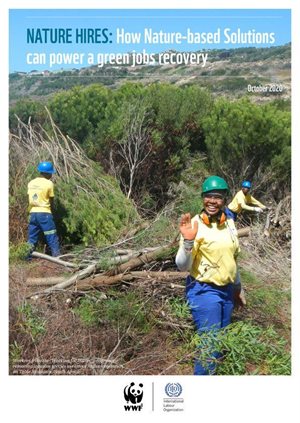
Subscribe & Follow
New report highlights role of nature-based solutions in post-Covid-19 recovery

Compiled by WWF and the International Labour Organization (ILO), the report uses international evidence through case studies and urges policymakers to explore the potential of nature-based solutions and integrate them into their responses to Covid-19.
Says Louise Scholtz of WWF South Africa’s Urban Futures Programme, "Building a better future of work means building it green and for the people who have lost jobs because of the pandemic, they need decent, productive work that delivers a fair income, security in the workplace and social protection for themselves and their families."
Covid-19 impact on already-existing crises
Covid-19 also risks accelerating the already-existing crises of climate change and nature loss, while its resulting economic impacts are exacerbating inequality and poverty.
"We need recovery packages to be sustainable by improving human well-being without harming nature and setting the foundations for transforming sectors and systems, while being able to maximise the creation of decent jobs – especially through nature-based solutions," shared Scholtz.
The report talks about the need for cross-collaboration and water-related nature-based solutions. In South Africa, WWF is driving the establishment of Water Source Partnerships which are private-public-community partnerships to achieve collective action in addressing water threats in the country’s strategic water source areas – the 10% of our land that provides 50% of our water.
Water security and job creation
Some of the activities to address water quantity include the clearing of water-intensive invasive alien vegetation. WWF has long been involved in such initiatives and was one of the founders – together with government – in creating South Africa’s Working for Water as part of the country’s job creation initiative. As an example of a nature-based solution and green jobs enabler, a case study on the achievements of this 25-year alien-clearing success story is in the #NatureHires report.
With water security and job creation as two priorities for South Africa, WWF has initiated and enabled other alien-clearing and job-creation projects in the Boland, Groot Winterhoek and Outeniqua Water Source Areas where unemployment is high in the small towns, combined with the need to clear dense stands of fast-spreading, water-thirsty species such as wattle and pine.
Some of the most job-intensive activities that are an integral part of many nature-based solutions include management of invasive species, ecosystem or watershed rehabilitation and restoration, reforestation and the use of agroecological approaches in food production.
Opportunities for nature-based solutions in cities
In cities, where the majority of South Africans live and which have been severely impacted upon by Covid, there are many nature-based solutions. These include parks, urban food gardens, green roofs, green walls, greenbelts, river corridors, green and blue infrastructure and sustainable urban drainage systems. Such nature-based solutions offer municipalities a triple dividend of delivering climate, economic and social benefits in the context of long-term recovery post Covid-19.
The job creation potential is important because initial estimates of job losses from the country’s National Income Dynamics Coronavirus Rapid Mobile Survey indicate that job losses have been disproportionately concentrated among the already disadvantaged groups and the low-skilled groups in the labour market. Additionally, workers in the informal sector who are self-employed have been highly vulnerable to livelihood shocks. Against this backdrop, investments in nature-based solutions that are labour-intensive can be critical to creating low-skill and fast-implementing jobs.
"As our government responds to the Covid-19 impacts, we have an opportunity to re-design stimulus packages that take advantage of positive solutions for people, climate and nature," concludes Scholtz.
Download the report and read the South African nature-based solutions case study on page 19.













